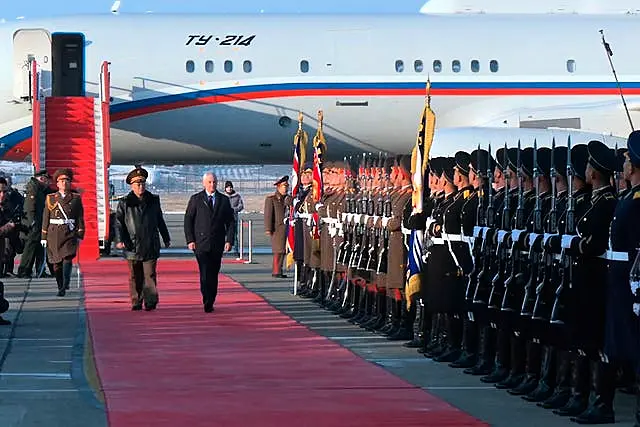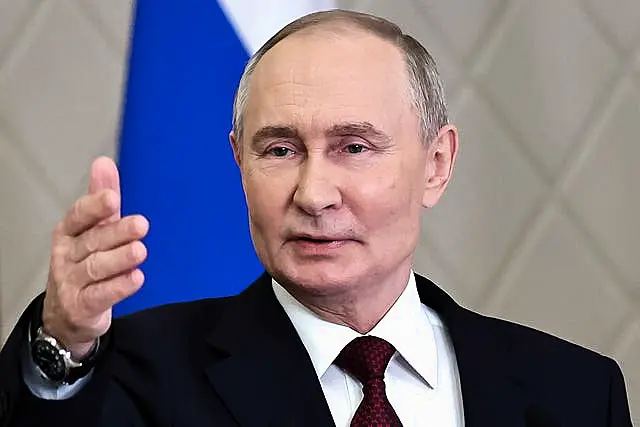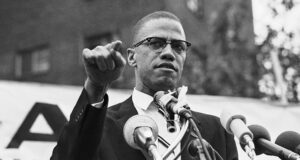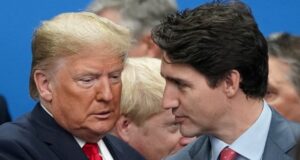Russian defence minister Andrei Belousov has arrived in North Korea for talks with military and political leaders as the countries deepen their alignment over Russia’s war on Ukraine.
Mr Belousov, a former economist, replaced Sergei Shoigu as defence minister in May after Russian President Vladimir Putin started a fifth term in power.
Photos released by Russia’s Defence Ministry showed Mr Belousov walking alongside North Korean defence minister No Kwang Chol on a red carpet laid out at a Pyongyang airport.
North Korean military officials were seen clapping under a banner that read: “Complete support and solidarity with the fighting Russian army and people.”
Mr Belousov noted after his arrival that military co-operation between the countries is expanding.
He applauded a strategic partnership agreement signed by Mr Putin and North Korean leader Kim Jong Un following their June meeting in Pyongyang, which he said is aimed at reducing tensions by maintaining a “balance of power” in the region and lowering the risk of war, including with nuclear weapons.
The June meeting demonstrated the “highest level of mutual trust” between the leaders, Mr Belousov said, and “also the mutual desire of our countries to further expand mutually beneficial co-operation in a complex international environment”.
Mr No also praised the expanding co-operation between the countries’ militaries and reiterated North Korea’s support for Russia’s war in Ukraine, describing it as a “just struggle to protect the country’s sovereign rights and security interests”.
The visit came days after South Korean President Yoon Suk Yeol met a Ukrainian delegation led by defence minister Rustem Umerov in the South Korean capital Seoul and called for the two countries to formulate countermeasures in response to North Korea’s dispatch of thousands of troops to Russia in support of its fight against Ukraine.
Mr Kim in recent months has prioritised relations with Russia as he tries to break out of isolation and strengthen his international footing, embracing the idea of a “new Cold War”.
The United States and its allies have said North Korea has sent more than 10,000 soldiers to Russia in recent weeks and that some of those troops were engaging in combat.

North Korea has also been accused of supplying artillery systems, missiles and other military equipment to Russia that may help Mr Putin further extend an almost three-year war.
There are also concerns in Seoul that North Korea in exchange for its troops and arms supplies could receive Russian technology transfers that could potentially advance the threat posed by Mr Kim’s nuclear weapons and missile programmes.
“The Russian defence minister doesn’t visit North Korea just to celebrate bilateral ties,” said Leif-Eric Easley, a professor at Ewha University in Seoul. “This visit indicates Putin and Kim’s military co-operation in violation of international law is about to increase further.”
Mr Yoon’s national security adviser, Shin Wonsik, said in a TV interview last week that Seoul assesses that Russia has provided air defence missile systems to North Korea in exchange for sending its troops.
Mr Shin said Russia has also appeared to have given economic assistance to North Korea and various military technologies, including those needed for the North’s efforts to build a reliable space-based surveillance system, which Mr Kim has stressed as crucial for enhancing the threat of his nuclear-capable missiles targeting South Korea.
Mr Shin did not say whether Russia has already transferred sensitive nuclear weapons and ballistic missile technologies to North Korea.

Mr Yoon’s office has not said whether the two governments discussed Seoul’s possible weapons supply to Ukraine during his talks with Mr Umerov.
Since Russia’s full-scale invasion of Ukraine in 2022, South Korea has joined U.-led sanctions against Moscow and provided humanitarian and financial support to Kyiv. But Seoul has avoided directly supplying arms, citing a longstanding policy of not giving lethal weapons to countries actively engaged in conflicts.
Mr Yoon has said his government will take phased countermeasures, linking the level of its response to the degree of Russian-North Korean co-operation.
Last year, Mr Kim hosted a Russian delegation led by Mr Shoigu and gave him a personal tour of a North Korean arms exhibition, in what outside critics likened to a sales pitch.
That event came weeks before Mr Kim travelled to Russia for a summit with Mr Putin, which sped up military co-operation between the countries.
During another meeting in Pyongyang in June this year, Mr Kim and Mr Putin signed a pact stipulating mutual military assistance if either country is attacked, in what was considered the two countries’ biggest defence deal since the end of the Cold War.
The Russian report about Mr Belousov’s visit came as South Korea scrambled fighter jets to repel six Russian and five Chinese warplanes that temporarily entered the country’s air defence identification zone around its eastern and southern seas, according to the South’s joint chiefs of staff.
The joint chiefs said the Russian and Chinese planes did not breach South Korea’s territorial airspace.




